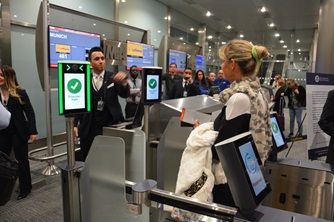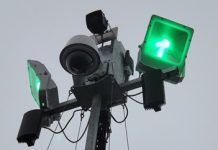Next time you fly out of Miami International Airport (MIA), you might be asked to present your face as your ID.
After experiencing its busiest year on record, the bustling airport — which serves tens of millions of passengers annually — plans to expand the use of controversial facial recognition technology to check travellers’ identification. The face-scanning software, already in place at some international gates at the airport, is slated to be installed at roughly 20 more departure gates by the end of September and a large majority of the airport’s more than 120 gates by next summer.
“The use of this technology allows [U.S. Customs and Border Protection] to make existing travel requirements more efficient, which creates a more seamless, secure, and safer experience for travellers,” Greg Chin, Miami-Dade Aviation Department spokesperson, wrote in an email to New Times.
Amid pressure from lawmakers to ramp up airport security post-9/11, facial recognition technology has made its way into dozens of airports across the United States and Puerto Rico in recent years. The Transportation Security Administration (TSA) plans to use it in more than 400 airports over the next few years.
In 2018, the technology was introduced at MIA by the U.S. Customs and Border Protection (CBP) to screen passengers arriving from international destinations. In May 2022, the Miami-Dade County Board of County Commissioners approved a $9.1 million contract for the county aviation department’s project to install facial screening technology at MIA’s gates to scan departing international travellers. The airport started to deploy the equipment around October 2022.
It works like this: Travellers present themselves in front of a kiosk with a camera that automatically matches their live image with passports on file in CBP data systems. The encrypted process is supposed to take seconds, eliminating the need for passengers to take out their boarding pass or passport, and is separate from TSA security screening.
The contract calls for Swiss IT company SITA to supply and maintain more than 240 biometric cameras for the airport. The deal involves $4.5 million in payments to SITA for equipment, software licensing, installation, training, and related fees. The company is set to earn $600,000 in yearly payments from the county for maintenance services, totaling more than $3.6 million over a six-year period.
U.S. citizens have the ability to opt out of the face-scanning process and instead submit to a manual review of their travel documents. However, according to CBP, all non-US citizens are required to go through the biometric identification process. “CBP will ensure that all legal and privacy requirements are met,” the agency says.
While touted as a way to hasten the air travel experience, facial recognition software is highly controversial, with some cities like San Francisco banning the use of the technology by police and other government agencies. As with other new technologies, it faces scepticism for potential misuse, data storage implications, and prospective bias in the screening process.








